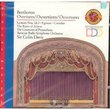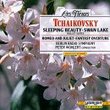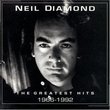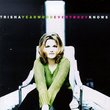| All Artists: Pyotr Il'yich Tchaikovsky, Igor Markevitch, London Symphony Orchestra Title: Tchaikovsky: Symphonies Nos. 4-6 Members Wishing: 0 Total Copies: 0 Label: Philips Release Date: 8/10/1993 Genre: Classical Styles: Historical Periods, Modern, 20th, & 21st Century, Romantic (c.1820-1910), Symphonies Number of Discs: 2 SwapaCD Credits: 2 UPC: 028943833523 |
Search - Pyotr Il'yich Tchaikovsky, Igor Markevitch, London Symphony Orchestra :: Tchaikovsky: Symphonies Nos. 4-6
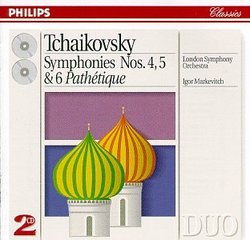 | Pyotr Il'yich Tchaikovsky, Igor Markevitch, London Symphony Orchestra Tchaikovsky: Symphonies Nos. 4-6 Genre: Classical
The last three symphonies remain for many listeners the ultimate expression of musical romanticism. Their gorgeous tunes, luscious orchestration, and huge emotional range tempt many interpreters to extremes of musical ex... more » |
Larger Image |
CD DetailsSynopsis
Amazon.com The last three symphonies remain for many listeners the ultimate expression of musical romanticism. Their gorgeous tunes, luscious orchestration, and huge emotional range tempt many interpreters to extremes of musical excess-- but not Igor Markevitch. These brilliantly played, exceptionally precise performances let the hysteria speak for itself, while focusing on the music's architectural strength. The results are uncommonly exciting, supple, and above all sensitive to the music's many beauties. Having withstood the test of time, and at two discs for the price of one, this might very well be a first choice for newcomers and collectors alike. Excellent recorded sound too. --David Hurwitz Similarly Requested CDs
|
CD ReviewsEtheral heights, plain price Mark McCue | Denver | 06/04/2002 (5 out of 5 stars) "I agree with Hurwitz: Markevitch adds a Gallic, feline suavity to these three old goodies and plays them for us like they're new. A lot of the Cyrillic wailing that is inherent in Russian performances is blissfully absent, and every content point, every expression, every luminous point of orchestration is given to us with Markevitch's sophisticated sense of quality. It's all real, no paste here.This Markevitch Tchiakovsky is like Faberge for the adornment of a Romanoff lady. And yet, look at the price! Congratulations to the producers for a superior reissue that will please everyone!" Romantic Expression: Tchaikovsky's Best Symphonies Rachel Garret | Beverly Hills | 01/21/2003 (5 out of 5 stars) "Peter Ilych Tchaikovsky, best known for his ballets, was also a symphonic composer. To those who are not familiar with Tchaikovsky's prolific, excellent taste of composition, this review should benefit you. He was indeed a masterful composer of symphonies. He was well educated in music, loved and appreciated Mozart and Beethoven and developed his own romantic style from humble beginnings. His 1, 2, and 3rd symphonies are less mature than his last three, but are quality works, scored with brilliant folk melody. The last three symphonies, 4, 5 and 6 are considered by many music lovers and fans of Romanticism, as the truest expression of romantic classical music. We must understand that Tchaikovsky was a composer who was a true romantic, who felt things deeply and whose life imitated his art. It was through his pain that Tchaikovsky gathered inspiration, composing and spinning out elaborate, elegant, romantic, inspirational music for the symphony. Tchaikovsky was a man whose homosexual lifestyle was shunned by Imperial Russia society. To avoid the detrimental ban of his music or perhaps his own exile, Tchaikovsky constantly projected an image of a sentimental, but heterosexual man (he was married for some time briefly before divorce) and his music was very popular in Russia and America. The last three symphonies are the perfect epitome of Romantic Era music, as well as a musical portrait of Tchaikovsky and his time. There are moments when the music becomes introspective and personal, tinged with deep sorrow at variance with exalted joy. It is the most human symphonies ever composed, at paar with the humanistic symphonies of Beethoven, especially in his Fifth and 9th. In his fourth symphony, Tchaikovsky was deeply influenced by Beethoven's "Fate" theme. Many Romantic composers of the late 19th century came up with their own "fate" themes. Also, it could be debated that Tchaikovsky was thinking more in lines of Bizet's opera Carmen when he composed the Fate Theme for his 4th symphony. At the time, he had just become financially independent and well off enough to take his music on tour, even to America, thanks to the sponsorship of his patron, the Countess Nadezda Von Meck. He dedicated the symphony to her, and though the first movement can be clearly a descriptin of Fate and overwhelming oddds, darkness and fire, after all, it is scored "allegro con fuego". The second movement is a romantic, slow-paced piece that rises to a crescendo and then winds down to the whispering caress of its elegant restrained melody. The last movement is a celebration, clearly Tchaikovsky's gratitutde for the Countess' support is described. Raucous, it is filled with Russian folk tunes.The Fifth is of an equally impressive scope. Melancholic in its first movement, it slowly rises into a waltz and then concludes with a triumph over fate, similar to Beethoven's Fifth symphony finale. The Sixth "Pathetique" is Tchaikovsky's final work. He wrote the symphony shortly before he died. It is a symphonic Requiem, although subtle in its intentions. The romantic themes dwindle and the last movement is a fatal blow and final breath of life. Tchaikovsky's music is deeply romantic, intensely emotional and perfect in orchestral color. Never before has a composer dedicated himself so wholesomely to his art. This cd is bargain price and at the hands of conductor Igor Markevitch and the London Symphony, it's the best interpretation of the symphonies." Your best bet for these three works Stan Vernooy | Henderson, NV | 09/25/2005 (5 out of 5 stars) "It's hard to categorize Markevitch's style in these symphonies. He doesn't impose his own ideology or personality on the music. He is fast and furious in those passages where speed and furiousness are the most effective approach. He swoons when the music should swoon, and he plays delicately when delicacy is called for.
A previous reviewer recommended the Mravinsky recordings over this set. I disagree. Mravinsky attacks the music; Markevitch loves it. At every phrase of every movement, Markevitch seems to have immersed himself in the music. He obviously developed a deep understanding of what the composer was trying to communicate, and he is in complete emotional sympathy with every nuance. It's hard to listen to these without feeling that this is exactly what Tchaikovsky himself would have wanted to hear. This isn't the very best orchestral sound I have ever heard on a recording, but it's certainly nothing to complain about, either. To get three such superb performances of Tchaikovsky's most famous symphonies for the price of one CD is one of the great bargains in the classical catalog. Grab this!" |

 Track Listings (6) - Disc #1
Track Listings (6) - Disc #1